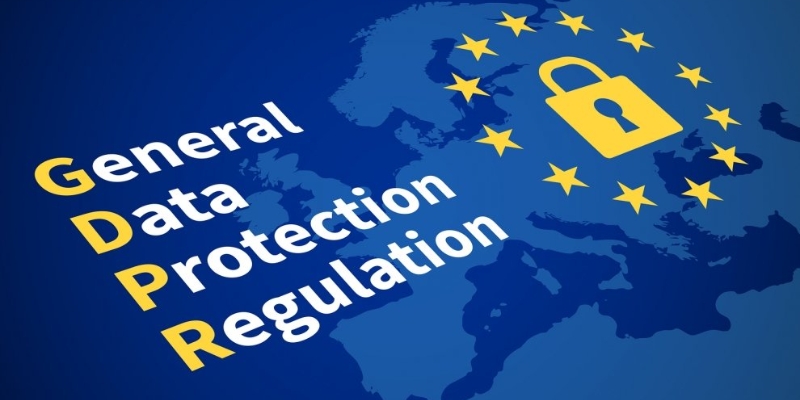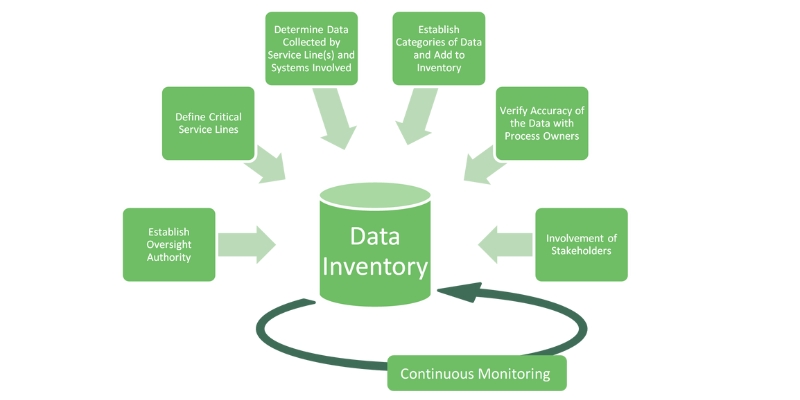Lucia Lee
Last update: 19/09/2025
For ecommerce businesses, few things are as damaging as losing customer trust. Data breaches, rising cyber threats, and stricter regulations mean that one mistake could cost not only sales but long-term brand reputation. That’s why data privacy in ecommerce should be a top priority. This guide walks you through everything you need to know about data privacy in ecommerce - why it matters, key regulations, and how to safeguard both your customers and your business.
Data privacy in ecommerce refers to the responsible handling of customer information throughout their shopping journey. It goes beyond simply preventing data breaches - it’s about ensuring that every piece of information, from names and addresses to payment details and browsing habits, is collected with consent, stored securely, and used transparently.
At its core, ecommerce data privacy involves:
When businesses take these measures seriously, they don’t just comply with legal requirements - they build trust, strengthen customer relationships, and create a safer shopping experience that encourages loyalty.
In ecommerce, trust is the currency that drives every transaction. When customers share sensitive details - like payment information or personal data - they expect businesses to safeguard it with care. Failing to do so can damage more than just sales; it can threaten a brand’s entire reputation. Here’s why data privacy is non-negotiable for ecommerce businesses:
Ultimately, data privacy in ecommerce isn’t just about avoiding penalties - it’s about earning trust, ensuring business continuity, and creating a safer shopping environment that customers want to return to.

Customer trust and loyalty
Because ecommerce often operates across borders, businesses must navigate a complex web of data protection laws. These regulations are designed to safeguard individuals’ privacy rights while holding companies accountable for how they collect, process, and store personal data.
Some of the most important regulations include:
General Data Protection Regulation (GDPR – EU/EEA)
A landmark privacy law in the European Union, GDPR sets high standards for transparency, accountability, and user consent. It requires businesses to clearly explain how data is used, secure explicit consent for processing, and provide users with rights such as data access and deletion. Non-compliance can result in severe fines.

General Data Protection Regulation
California Consumer Privacy Act (CCPA – USA)
Enforced in California, CCPA gives consumers the right to know what personal data is collected, how it’s used, and with whom it’s shared. It also provides opt-out options and rights to data deletion. Its extension, the California Privacy Rights Act (CPRA), has strengthened these protections further.
Personal Data Protection Act (PDPA – Singapore)
The PDPA governs how organizations in Singapore collect, use, and disclose personal data. It emphasizes consent, accuracy, and mandatory breach notifications.
Personal Information Protection and Electronic Documents Act (PIPEDA – Canada): Canada’s federal privacy law requires private-sector organizations to obtain consent for data collection and provide individuals with access to their information, while ensuring accuracy and security.
Other Regulations Worldwide: Beyond these major laws, countries like New Zealand, Switzerland, and the UAE have also enacted or updated privacy regulations, while the ePrivacy Directive in Europe specifically governs the use of cookies and electronic communications.
For ecommerce businesses, compliance means more than just meeting legal requirements. It’s about demonstrating accountability, safeguarding consumer trust, and being prepared for future regulatory changes in an increasingly global marketplace.
Establishing a strong data compliance framework is essential for ecommerce businesses to ensure personal data security and meet evolving legal standards. Rather than treating compliance as a one-off task, it should be seen as an ongoing process built into daily operations. Here are some best practices to ensure data privacy in ecommerce:
Identify relevant regulations
Compliance requirements vary depending on the type of data you collect and the regions you serve. For instance, a retailer handling medical information may need to comply with HIPAA, while businesses serving EU customers must meet GDPR standards. Consulting a compliance specialist at this stage can save costly mistakes later and ensure full regulatory compliance.
Build a data inventory
A centralized data inventory provides a clear picture of what information you collect, how it’s used, where it’s stored, and who has access. This not only makes responding to customer data requests easier but also helps you eliminate unnecessary practices, ensure lawful user data protection, and respond quickly in case of breaches.

Build a data inventory
Practice data minimization and purpose limitation
Collect only the information you truly need, and use it strictly for the purposes you’ve communicated. This reduces exposure to unnecessary risks, strengthens information safeguarding, and aligns your operations with modern privacy laws.
Develop a data protection policy
Just like shipping or return policies, clear privacy policies show customers how their information is collected, stored, shared, and secured. Key elements include data types collected, storage duration, security measures, third-party sharing practices, and customer rights (such as opting out or requesting deletion). A legal professional’s input can ensure accuracy, consumer confidentiality, and compliance.
Strengthen security infrastructure
Technical safeguards are the backbone of data privacy in ecommerce compliance. Implement SSL encryption for secure transactions, maintain PCI compliance for payments, and adopt advanced cybersecurity measures like multi-factor authentication, AI-based threat monitoring, and regular vulnerability assessments. These defenses go beyond protecting systems - they reinforce customer trust in your brand.
Also read: Data Privacy In Ecommerce: An Ultimate Guide for Businesses
Consent management
Customers should always be aware of how their data is being used. Clear consent protocols, supported by tools like Piwik PRO, make it easier to capture, track, and manage consent while enhancing transparency and trust building.
Prepare for data breaches
Even with the best safeguards, breaches can happen. Having a tested incident response plan - covering prevention, immediate remediation, and transparent communication with customers - can limit damage and preserve long-term credibility.
Provide ongoing training and awareness
Employees play a critical role in protecting customer data. Training should cover topics such as proper data handling, strong password practices, multi-factor authentication, access control, and recognizing security threats. Embedding security awareness in company culture supports trust building and reinforces user data protection.
Embed privacy by design
Integrate data privacy in ecommerce considerations from the outset of product or feature development. This approach not only ensures smoother compliance but also prevents costly redesigns later on while prioritizing personal data security from the ground up.
Leverage technology and frameworks
Automated tools can simplify compliance management, from cookie consent tracking to vendor-risk assessments. Platforms like OneTrust or TrustArc offer features for managing data subject requests, data encryption, monitoring third-party risks, and adapting to changing laws. Emerging technologies like AI (for predictive privacy risk detection) and blockchain (for decentralized, secure data storage) are also reshaping how businesses approach information safeguarding.
Conduct regular audits and compliance checks
Compliance isn’t static. Regular audits help uncover vulnerabilities, identify gaps, and keep pace with evolving regulations. Frequent checks demonstrate accountability, reinforce regulatory compliance, and show customers that their privacy is taken seriously.
Safeguarding customer information is one of the toughest responsibilities for ecommerce businesses. Yet many companies, even well-established ones, fall into common pitfalls that weaken their privacy practices. Some of the key challenges of ensuring data privacy in ecommerce include:
Data breaches
Ecommerce platforms are prime targets for cybercriminals looking to steal sensitive details such as payment information, personal addresses, and login credentials. Beyond financial loss, a breach can severely damage reputation and lead to costly lawsuits.
Compliance with privacy regulations
Laws like GDPR and CCPA are complex and constantly evolving. Many businesses struggle to keep up, and failing to comply can result in heavy fines, audits, and legal penalties.
Third-party data sharing risks
Retailers often work with payment processing software, shipping companies, and marketing platforms. But handing over customer data to external partners comes with risks, especially if those vendors lack strong data protection standards.
Lack of transparent data practices
Customers increasingly expect clarity about how their information is collected, stored, and used. Companies that rely on vague or generic privacy notices often fail to earn trust or meet customer expectations for openness and control.
Insider threats
Not all risks come from outside. Employees or contractors with access to sensitive systems can mishandle or misuse data, whether intentionally or through carelessness, creating privacy breaches that are just as damaging as external attacks.

Insider threats
Neglecting encryption and safeguards
Some businesses overlook basic protections, such as encrypting internal communications or securing data backups. These oversights leave critical information exposed to unnecessary risk.
The landscape of data privacy in ecommerce is evolving rapidly, shaped by new technologies, rising consumer expectations, and increasingly strict regulations. To stay competitive and maintain customer trust, businesses must anticipate these changes and adapt proactively.
Consumer data empowerment
Shoppers today expect more than just seamless transactions - they want genuine control over their personal information. As awareness of digital rights grows, customers are demanding tools that let them manage consent, request deletion, or opt out of data collection with ease.
For businesses, the challenge lies in balancing personalization with privacy. By leveraging anonymized data and advanced algorithms, retailers can continue offering tailored experiences while respecting consumer preferences. Clear consent practices and transparent communication will be essential for building lasting loyalty.
Enhanced regulatory landscape
Privacy regulations are becoming stronger, with frameworks like GDPR and CCPA constantly being refined. Anticipated updates are expected to address AI-driven decision-making and stricter accountability measures, meaning companies must pay closer attention than ever to compliance.
For ecommerce, this translates into greater investment in compliance capacity. Conducting algorithm audits, reviewing ethical implications of data use, and embedding accountability across operations will help businesses meet evolving standards while avoiding heavy penalties.
Technological innovations
New technologies are redefining how data privacy in ecommerce can be protected. Artificial intelligence and machine learning are already being used to detect suspicious activity in real time, enhancing fraud prevention and overall security. At the same time, they raise important concerns about fairness and transparency, which makes robust governance frameworks a necessity.
Blockchain technology is also gaining traction as a tool for decentralized data storage, reducing the risks of a single breach. Alongside this, secure analytics platforms are making it possible to process data responsibly, automate consent management, and keep business practices aligned with legal requirements.
Data privacy is the cornerstone of trust and growth in ecommerce. As regulations of data privacy in ecommerce tighten and customer expectations rise, businesses that prioritize secure, transparent data practices gain both compliance and competitive advantage.
At Sky Solution, we design ecommerce platforms with privacy and security built in - helping you protect customer data, build trust, and scale confidently. Contact Sky Solution today to future-proof your ecommerce business with solutions that put privacy first.